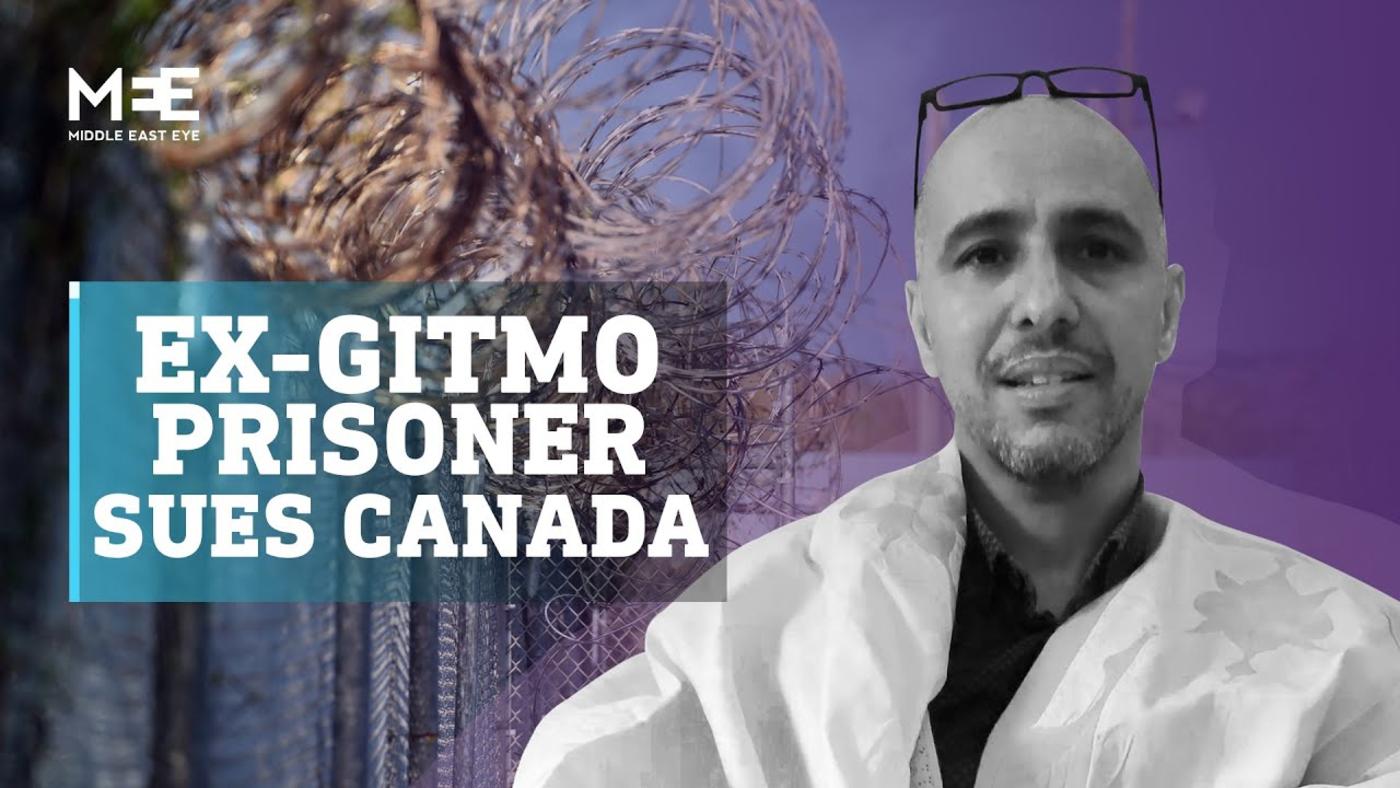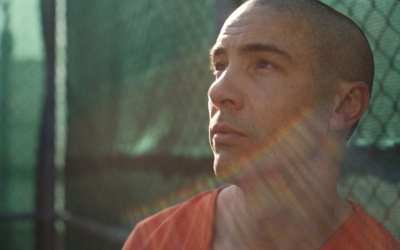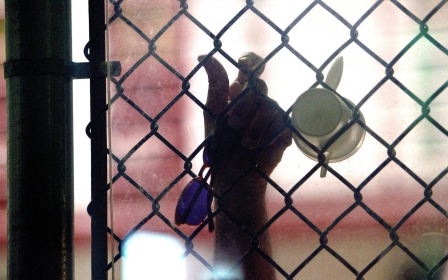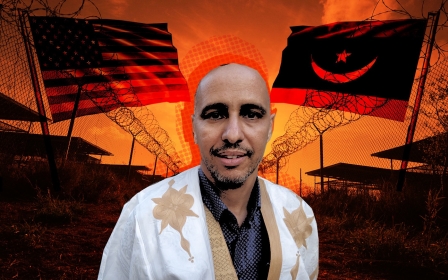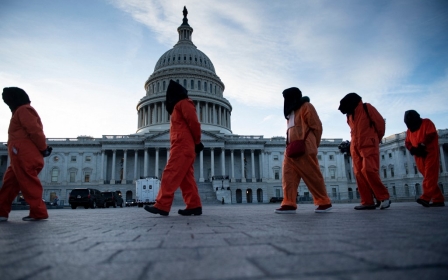Former Guantanamo detainee explains why he's suing Canada
Mohamedou Ould Slahi hoped his release from Guantanamo in 2016 would mark a new stage in his life, one where he could finally live freely after decades of imprisonment and torture.
But years later, without a passport and the ability to travel free of restrictions, Slahi is now suing the Canadian government for C$35m ($28m) over its alleged role in helping the US send him to Guantanamo.
Speaking to Middle East Eye, Slahi said he filed the lawsuit out of necessity, adding that it was the only path he had left in order to truly prove his innocence.
"I never wanted to sue anyone, because I chose forgiveness," he told MEE.
'Without the Canadian government, I would never have been kidnapped'
- Mohamedou Ould Slahi
"I want Canada to tell the world this was a mistake… I want to clear my name. This is very important to me."
New MEE newsletter: Jerusalem Dispatch
Sign up to get the latest insights and analysis on Israel-Palestine, alongside Turkey Unpacked and other MEE newsletters
After the 9/11 attacks and the subsequent US "war on terror", Slahi was arrested in his native Mauritania in 2001 and then taken to Amman, where he was held in solitary confinement for more than seven months.
The US later moved him to the Bagram air base in Afghanistan, and then to Guantanamo Bay in 2002, where he would be incarcerated for more than a decade.
In US detention, guards tortured Slahi in a number of ways, including through sleep deprivation, stress positions, and being exposed to long bouts of excruciatingly loud heavy metal music.
While Slahi's story outlines America's notorious use of torture after 9/11, it also reveals how the US and other governments around the world collaborated and shared intelligence - and participated in extraordinary renditions - in the name of national security.
"The Canadian government swallowed all the erroneous intelligence that the American agencies passed on to them," he said.
"Without the Canadian government, I would never have been kidnapped. Without the Canadian government, I would never have been selected for the torture programme.
"Instead of the protection I was seeking, I was literally thrown under the bus."
During his time in detention, Slahi wrote an autobiography that would go on to become the best-selling memoir, Guantanamo Diary, which was later adopted into a Hollywood film.
'Tea and sugar'
Originally from Mauritania, Slahi travelled to Germany and graduated there with an electrical engineering degree.
While in Germany in the 1990s, he had - for three weeks - interrupted his studies to join the ranks of the US-backed Mujahideen against the Soviet-backed communist government in Afghanistan. He then broke off ties with the group. Slahi has stated that he had never been an enemy combatant against the US.
Slahi was unable to obtain permanent residency in Germany, and moved to Canada in 1999.
But his time in Afghanistan had caught the eye of US and Canadian authorities, and he fell under the surveillance of the Canadian government after being allegedly linked to the Millenial Plot, a plan to bomb tourists at millennium celebrations in 2000.
'I just wanted an apology and I want them to give me back my papers that they took away'
- Mohamedou Ould Slahi
While living in Montreal, Slahi made a phone call in which a friend asked to come over for tea. Slahi replied asking him to bring over "tea and sugar", which Canadian officials had believed was code for explosives.
Slahi told MEE that because his friend, whose name he said was Rauf, was being tracked by Canadian authorities, Ottawa thought they had violent plans.
"But I was only planning to make tea," he said.
Canadian officials have never discussed their investigation into Slahi, but the Toronto Star revealed that Ottawa had provided information to Washington - and also that Canadian Security Intelligence Service agents travelled to Guantanamo in 2003 to question him.
Last year, FBI agent Fred Humphries told La Presse that Canadian authorities had "exaggerated the importance" of the intelligence they shared with the US, such as the "tea and sugar" call.
At the time of the interview, Canada's attorney-general had not commented on Slahi's allegations against the government, and Slahi's court case is still ongoing.
Targeted Islamophobia
Slahi, now 51 and working for a Dutch theatre company, told MEE that the lawsuit was not just about seeking compensation for Ottawa's role in his detention and torture, but also because he wants to be able to travel to Canada.
"My lawyer said the only way for the Canadians to answer us is if we hit them with a lawsuit," he said.
"I just wanted an apology and I want them to give me back my papers that they took away, because I need a life - because my country won't give me a passport.
"I want to be able to go to Canada freely, and meet my readers and meet my supporters, and do my talks in all the cities in Canada. Because I love the Canadian people."
But he also said that his case was a part of a pattern of Islamophobia, with the Canadian government having a history of targeting individuals based on their religion.
Canada has been hit with multiple lawsuits over its role in contributing to the detention of individuals in Guantanamo, as well as countries in the Middle East, such as Jordan, Egypt and Syria.
In 2007, Maher Arar was given C$10.5m ($8m) in compensation and an apology from then-prime minister Stephen Harper for Ottawa's role in his detention and torture in Syria.
Canadian Omar Khadr, who was sent to Guantananmo at the age of 15, was also given C$10.5m ($8m) in a settlement and an apology for breaching his charter rights while he was held as a juvenile in Guantanamo.
Three other Canadians, Abdullah Almalki, Ahmad El Maati and Muayyed Nureddin, also split C$31.3m ($24.5m) compensation over a settlement for Canada's role in their detention and and torture in Syria and Egypt.
Middle East Eye delivers independent and unrivalled coverage and analysis of the Middle East, North Africa and beyond. To learn more about republishing this content and the associated fees, please fill out this form. More about MEE can be found here.


